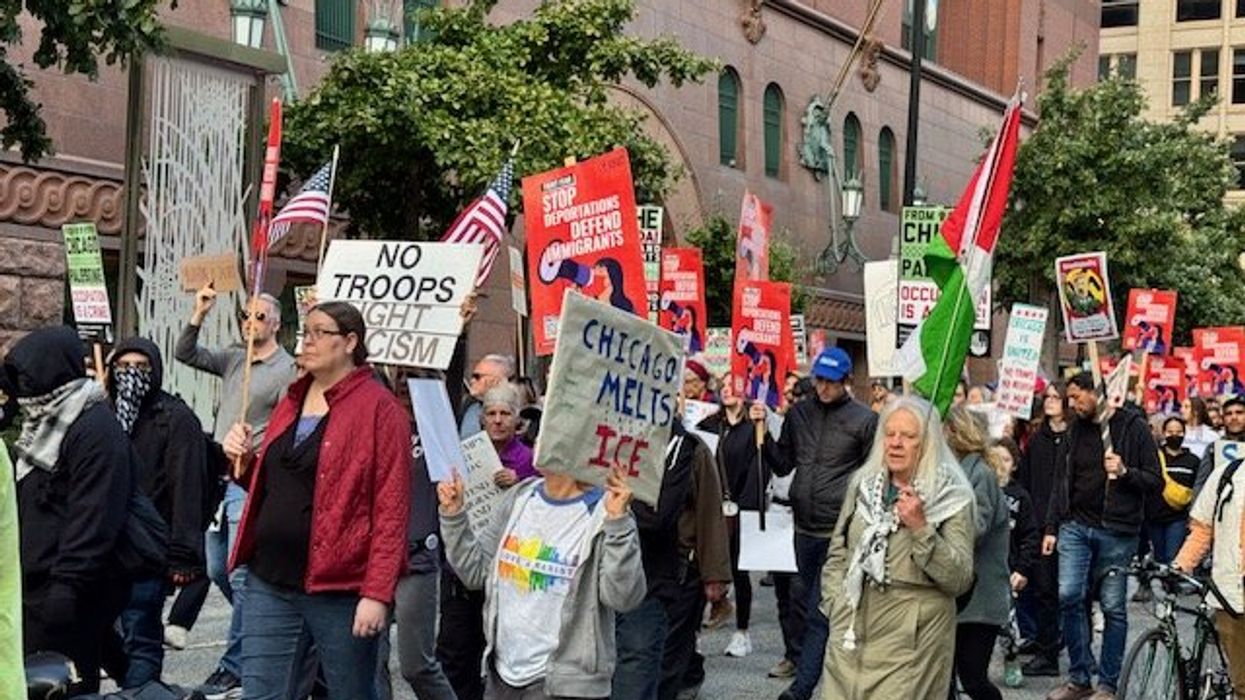CHICAGO — Thousands of demonstrators gathered Saturday afternoon in Chicago’s Gallery Plaza to protest the Trump administration’s deployment of the National Guard to the city.
Community members assembled around 5 p.m. and marched through downtown Chicago delivering a pointed message to the president about his plans to ramp up ICE operations.
“It’s important to voice for those that are not here, that can’t be here,” said Jose Luis Leon, the son of Mexican and Panamanian immigrants who attended with his family.
Leon said some community members stayed home, fearing ICE presence and the possibility of being detained.
The protest followed a Truth Social post from President Trump that showed an apocalyptic image of him in Chicago with the caption “‘I love the smell of deportations in the morning… Chicago about to find out why it’s called the Department of WAR.”
His administration stated that it would intensify immigration enforcement in Chicago, much like it had in Los Angeles and Washington, D.C., and would deploy National Guard troops to support federal operations.
“Are they gonna go home at the end of the night? That’s what they’re scared of,” Leon said. “I know some people that didn’t come because of that fear.”
Organizers said the demonstration wasn’t only about sending a message to Washington but also about preparing residents.
“He said that Chicago is going to learn what he means by department of war. That is threatening war on an American city,” said Jay Becker, co-facilitator for the Refuse Fascism Chicago chapter and an organizer of the protest. “That is not only illegal and unconstitutional, but you cannot call it anything but fascism.”
Her statement echoed a response from Gov. J.B. Pritzker, who wrote on X that Trump’s post threatened war on an American city. “This is not a joke. This is not normal,” Pritzker said.
This year’s Mexican Independence Day festival, El Grito Chicago, scheduled for Sept. 13–14 in Grant Park, was canceled. Organizers said the celebration, which draws tens of thousands, posed too great a risk in light of the deployment and heightened ICE activity.
Becker also handed out whistles, which she said residents use to alert each other when ICE agents appear. She urged protesters to record their encounters and keep a record of federal activity.
Violence in Chicago is another point the administration has cited in sending troops. The White House has pointed to recent shootings, while local officials note that violent crime overall has been on a downward trend in the city.
Chicago Mayor Brandon Johnson pushed back online, posting on X: “We must defend our democracy from this authoritarianism by protecting each other and protecting Chicago from Donald Trump.”
“Trump bringing the National Guard to Chicago is illegal and a waste of resources,” said Kevin Martinez, an Army veteran who argued the focus should be on youth and police reform, not federal troops.
“Chicago has been specifically frustrating because we know our rights,” said Omar Flores, chair of the Chicago Alliance Against Racist and Political Repression. “We’re going around telling people their rights so they’re not able to carry out arrests the way they want to.”
Unlike National Guard deployments in Washington, Chicago’s operation is expected to focus exclusively on immigration enforcement rather than crime prevention.
Chicago has long been a focal point for DHS and ICE because of its large immigrant population and sanctuary city status. Illinois has also enacted robust laws limiting cooperation with federal immigration enforcement, including the Illinois Trust Act and the Way Forward Act, which prohibit the state from entering into detention contracts with the federal government.
Communities in neighborhoods such as Pilsen and Back of the Yards have expanded rapid response networks, training volunteers to monitor and report ICE activity. Flores described these efforts as effective.
By evening, demonstrators dispersed, carrying signs and “know your rights” flyers to share with neighbors.
Angeles Ponpa is a multimedia journalist from Illinois. A graduate student at Northwestern Medill, specializing in Politics, Policy, and Foreign Affairs, Ponpa is a former Fulcrum intern.




















